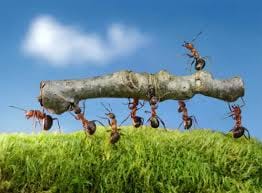 ANALOGIES FROM NATURE IN CONTEXT: EVERYTHING IN GOD’S CREATION – BIG AND SMALL, PROVIDES VALUABLE LESSONS FOR US ALL
ANALOGIES FROM NATURE IN CONTEXT: EVERYTHING IN GOD’S CREATION – BIG AND SMALL, PROVIDES VALUABLE LESSONS FOR US ALL
By Sunday Chilufya Chanda
Introduction
The natural physical world around us including plants, animals and landscapes provide valuable lessons for humanity.
As the 19th Century Poet Alfred Billings Street once wrote:
“Nature is man’s teacher. She unfolds her treasures to his search, unseals his eye, illumes his mind, and purifies his heart; an influence breathes from all the sights and sounds of her existence.”
Even the scriptures use nature and elements of God’s creation to create analogies and for lessons of life that provide us with a wealth of wisdom.
For instance the Book of Proverbs in Chapter 6 uses the analogy of the ant to admonish lazy individuals and those don’t plan for the future to take a leaf from the ways of an ant in order to be hardworking, purposeful, cooperative and full of foresight:
“Go to the ant, you sluggard; consider its ways and be wise!
It has no commander, no overseer or ruler, yet it stores its provisions in summer and gathers its food at harvest.
How long will you lie there, you sluggard? When will you get up from your sleep?
A little sleep, a little slumber, a little folding of the hands to rest— and poverty will come on you like a thief and scarcity like an armed man”. (Proverbs 6:6-11)
Sometimes creatures that are not so appealing or even loathed are also used to provide lessons for life and living.
One example in this regard is the Locust.
Locusts are considered enemies of agriculture. They are a threat to food security and are consequently perceived as an enemy of man; yet they too provide valuable lessons for mankind.
They are individually not powerful, but when they get together in a huge swarm, they are formidable! This is an illustration of strength in unity.
When people band together in unity and cooperation, things get done.
Locusts also don’t really have a leader, but they somehow understand when it is necessary to band together, and “march in rank” so to speak.
As the proverb goes:
“The locusts have no king, yet all of them go out in ranks.” (Proverbs 30:27)
God’s creation is an enigma!
Like the Locust, even cockroaches have their place in the ecological cycle as well as the lecture theatre of life.
Entomologists (scientist who study insects) say that the cockroach is actually a gifted teacher in the art of survival and adaptability, especially in environments that may seem a bit hostile.
The cockroach teaches us how to use what we have available to us for survival.
Drawing from the lessons of entomology, some nations have accordingly taken on some positive attributes of nature from which they have developed positive work ethics that have accelerated the development of their countries.
As a country, we have a lot to learn from them.
Take China for instance.
Over the past 30 years China has built up the world’s second largest economy, tipped to overtake the US within the next few years.
Back in the early 1980s, China’s GDP per capita was lower than that of most European countries; yet by 2000, that had changed and the gap continues to widen.
But that did not just happen overnight like the magical abracadabra!
It took hardwork!
The Chinese drew lessons from nature.
The People’s Republic of China is full of diligent people that are as hardworking, purposeful, cooperative and full of foresight as ants.
They are as busy as bees “making honey”.
Like locusts they have used the numerical advantage of their population banding together in unity and cooperation and they have made exponential progress.
In terms of the crucial attribute of survival through adaptability, they have also drawn invaluable lessons from that insect that has mastered the art of survival and which entomologists classify of the order “Blattodea” - the cockroach.
The Chinese are focussed on achieving their goals even if it means living on basics. They put hard work above “ichipale” (pretentious false luxuries) and that is why there a few places on the globe- if any where they are not thriving.
Conclusion
We as a nation have a lot to learn from lessons of nature.
Even small things are important! They provide us with wisdom and insight.
Speaking of wisdom, the snake though a perceived enemy of mankind provides valuable lessons in wisdom.
Serpents are known to be sensitive to the environment. They are wary about predators and alert to risks and dangers and they too are able to adapt to different terrains and the harshest of environments.
Perhaps, the reason why they are able to thrive even under the most challenging circumstances is because they are constantly vigilant with their eyes always open...They are prudent and ready to strike at both their predators and preys.
We too as Zambians need to be ever watchful and vigilant against some wolves dressed in sheepskin who promote tribalism, xenophobia, fake news and all manner of vices.
We therefore need to be as “shrewd as snakes and as innocent as doves.” (Matthew 10:16, KJV)
Nature- with all its creatures great and small in context provides us with invaluable lessons for the development of our nation.
Ends…//…


Comments
Post a Comment